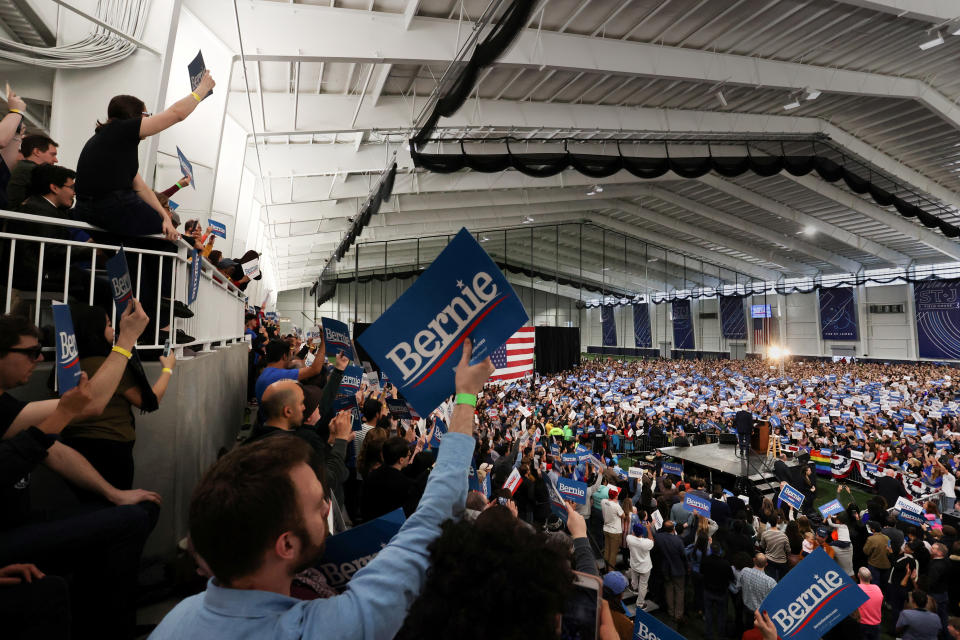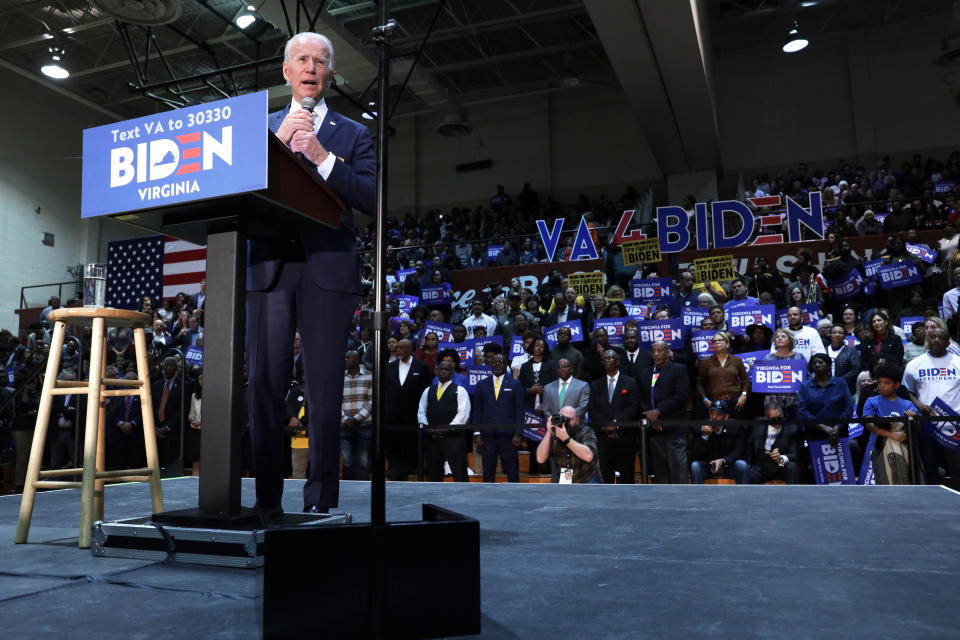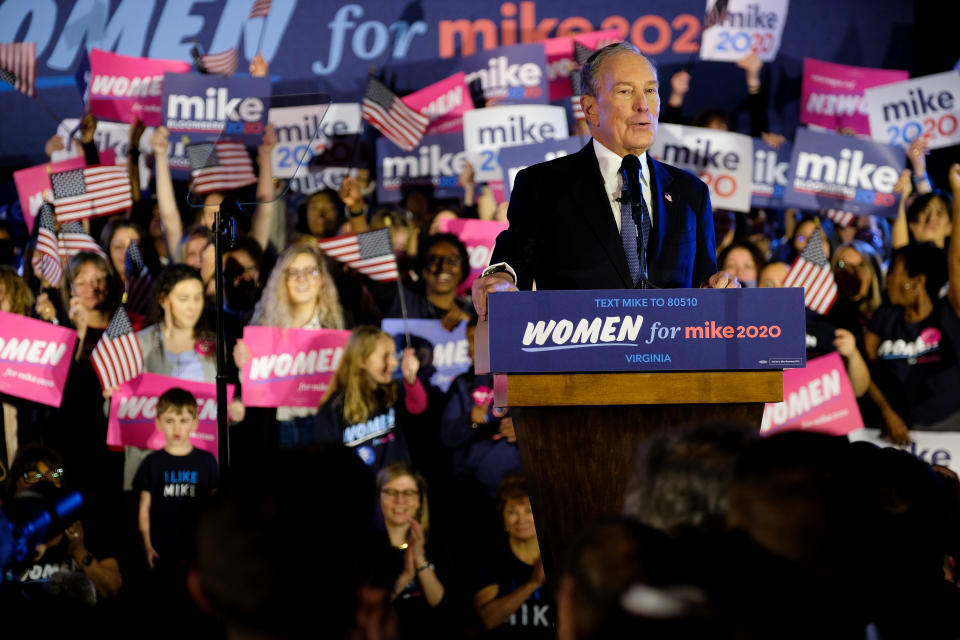Virginia ahead of Super Tuesday: ‘We live in a bubble here’
Springfield, Va. – It’s one of the few things Democratic voters in this area can agree on: “As everyone says, we live in a bubble here,” said Sandy Graves, one of the first supporters through the door to see Mike Bloomberg at an event in McLean on Saturday.
Hours later, Dan Hale, a teacher in West Springfield, used almost identical language (without prompting) while waiting for Bernie Sanders. “In Northern Virginia, I think we’ve always been a little bit of a bubble anyhow,” he said.
The Northern Virginia economy is, indeed, unlike anywhere else in the country, thanks to spending from “across the river.” The 2019 State of the Commonwealth Report found that federal spending directly accounts for a whopping 26.7% of Northern Virginia’s GDP. By comparison, just 4.2% of the U.S. GDP as a whole can be directly attributed to the DC spending.

As the report notes, ”we must deal with the stark reality that federal government spending provides fuel for the economic engine that drives the Commonwealth.”
Virginia is the largest swing state set to vote on Super Tuesday (March 3) and government spending is shaping the race in a range of ways that will likely determine who ends up on top.
An economy unlike any other
The symbiotic relationship between Washington, D.C. and Northern Virginia has been very good for the state’s economy.
In December 2019, Virginia's unemployment rate stood at just 2.6%, tied for sixth-lowest nationwide. Virginia's two direct neighbors, Maryland and West Virginia, ranked 26th and 48th, respectively.
The statistics in Northern Virginia are even more impressive. Two of the counties closest to Washington, D.C. – Arlington and Alexandria – showed unemployment rates of just 1.6 and 1.8%.
Virginia has become somewhat less reliant on the federal government over the last decade thanks to the growth in the private sector, but perhaps not as much as many Virginians think. More and more federal spending has taken the form of the government contracting a range of services out to nominally private businesses.
“It just looked and felt a lot like the private sector,” says Jeannette Chapman, who runs an institute dedicated to analyzing the D.C. region’s economy. “However, when we have federal government shutdowns because of sequestration, it becomes very apparent that it wasn't entirely private sector.”

Perhaps nothing has shaped the local economy more than military spending from the Pentagon (which itself sits in Virginia). It’s a symbiotic relationship, says Robert M. McNab, professor of economics and one of the lead authors of the State of the Commonwealth Report. “If the federal government budget and especially the defense budget, increases, the Virginia economy tends to pick up steam.” And the reverse is also true: the region takes a hit when spending drops.
It leads to voters who view “the decisions they make in those big white buildings over the river” both through a political as well as an economic lens.
“As an employer, this area values consistency and predictability – probably, more than anything beyond policy,” says Chapman.
A question of structural change vs. stability
That question of predictability versus shaking up government came up again and again in conversations with voters ahead of the primary.
Ylanda Hill works for the federal government and came out Saturday to learn more about Mike Bloomberg. “The federal government can be a great place to work, but what we deal with is always a change in administration,” she says. She doesn’t support Bernie Sanders, because “I think there needs to be a balance of government and everything else.”

Hill, like many in the Bloomberg crowd, prioritizes stability in government operations. Ted Graves, another supporter along with his wife Sandy, said he supports Bloomberg because “I can’t think of anyone that’s more appropriate to take the politics out of government and focus on the systems that help people.”
There was plenty more openness in a crowd of Bernie Sanders supporters for the idea of shaking up the government. “I think he’s right that it’s a structural problem,” said Valerie Leonard, following a speech by Sanders in Springfield. “I totally believe it’s a fix, it’s phony capitalism and he’s right to be a socialist. I think we can afford better.”
Leonard argued that Sanders wasn’t going to shake up the region she lived in. “He’s not talking about being anti-bureaucrat, the way the government works is with these wonderful government workers,” she said. “As he said, he’s not against government”.
For his part, Sanders stayed on his message of shaking up government and the financial industry during his speech on Saturday. “The military industrial complex is getting very worried that we may not continue spending more on the military than the next 11 nations combined,” he said.
The crowd, many of whom are part of that complex, let up a cheer.
Ben Werschkul is a producer for Yahoo Finance in Washington, DC. Jessica Smith contributed reporting.
Read more:
Coronavirus and the 2020 elections: How the candidates are responding
Every Democrat running for president is at least open to taxing stock trades
Read the latest financial and business news from Yahoo Finance
Follow Yahoo Finance on Twitter, Facebook, Instagram, Flipboard, LinkedIn, YouTube, and reddit.
